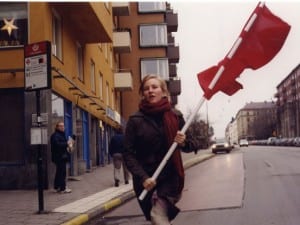Ute Lemper is a world-renowned and charismatic German chanteuse who never seems to age (physically or spiritually). As part of the London Literature Festival Ute Lemper Sings Pablo Neruda organised by the Southbank Centre was a fantastic concert not only dedicated to the memory of Pablo Neruda, one of the masters of Chilean poetry, but also to the memory of everything that music and poetry seems to have lost in the transition to the fast paced, ruthless, popular entertainment industry.
Neruda is best known as “the old man” in the film titled Il Postino: The Postman directed by Michael Radford. If we come to what was truly sublime about Ute Lemper’s singing of Pablo Neruda songs, it can be said that Lemper’s depth of knowledge on history and political awareness shows she researched the poet, his life and his works in detail and found the perfect balance to create a song cycle contemporary enough to appeal to today’s society but also a balance that serves Neruda’s poetry with loyalty and respect.
Lemper’s vocal improvisations, an enchanting line up of musicians playing the piano (Vana Gierig), double bass (Steve Millhouse), bandeneón (Victor Villena), cajon and percussion (Todd Turkisher), guitar and ukulele (John Benthal) and violin (Frank Reinecke) but most of all their passion for Latin American poetry exuded from the stage onto the seats of the venue. With music written by Marcelo Nisinman and Ute Lemper, the notes and the words sang in Spanish, French and English carried the audience off to the Casa de Isla Negra, where Neruda and his third wife Matilde Urritia lived when in Chile and where they now rest in peace. Given the recent research and the exhumation of Neruda’s corpse to determine his cause of death and to ascertain whether Pinochet ordered for him to be poisoned or if he died of cancer, this performance was all the more emotional for aficionados of Neruda’s sweet and sour love poems.
Concentrating mostly on the love poems Neruda wrote at the Casa de Isla Negra, Lemper provided background information about Neruda’s life and work, and referred to his work as a “cry for freedom”. It was easy to see that she was just as emotional about Neruda’s poetry and connected with the content of the poems to a great extent. She read some of the poems to us in English before she sang their Spanish or French adaptations. Your Hands (Tus Manos), If You Forget Me (Si tu me olvidas), Absence (Ausencia), A Song of Despair (Veinte poemas de amor y una canción desesperada) were some of the poet’s most well-known works that were performed. The salty and moist smell of the sea, the footsteps remaining in the sands where Neruda walked and his physical absence embraced us. Both Lemper and Neruda were saluted with a thunderous applause as the musicians left the stage one by one and the music died down. The poetry fell silent.
The applause managed to persuade Ute Lemper and her wonderful team of musicians back onto the stage. The encore consisted of a seamless performance of Kurt Weill’s Bilbao beginning in the German style and swiftly transitioning to a subtle swing. Then came Mack the Knife; another of Weill’s compositions with lyrics by Bertolt Brecht. Lemper tried to get her fellow musicians performing on the stage to whistle the tune but they seemed reluctant, so she turned to the audience who whistled that undying melody. Lemper danced and danced, she joked around with the bandeneonista and her every move exhaled “Cabaret”. The remark “Life is a cabaret” poured from her lips. Moving onto “All That Jazz”, the most famous song of the musical Chicago first staged in 1975, she shone vibrantly and ended the concert at its peak. She left us hungry for more music, more poetry, more love, and more life.
Hande Eagle
Ute Lemper Sings Pablo Neruda, was at the Queen Elizabeth Hall, 28 May.
Credits
1. Image courtesy of the Southbank Centre.





